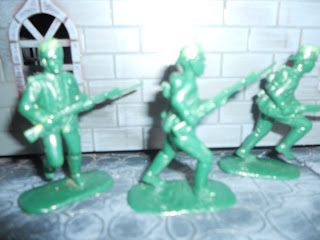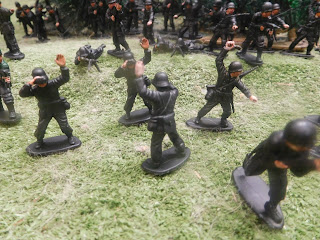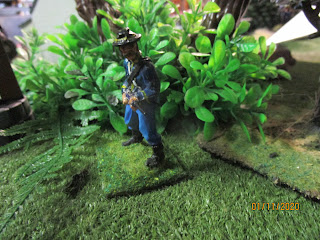Wargame Rules for Heroes
Have you ever wanted to wargame movies like The Magnificent Seven but wondered how seven gunfighters would survive more than a couple of moves? The answer is to give them multiple wound capacity and saving throws but not to the bad guys, except for their leader. The rationale is that the characters are so heroic that they will keep fighting despite their wounds. They have saving rolls because they are battle savvy and more likely to dodge a bullet.
Warhammer 40K has characters with multiple wounds and multiple attacks as well as superior skill and initiative. The 'look out sir' rule also allows an extra save where the wound is instead suffered, on a certain dice roll, by a subordinate. Warhammer also has similar rules for heroes with the added advantage for heroes that the casualties are taken from the rear ranks except when an individual, hero or otherwise kills an enemy hero in melee. As the hero usually has superior initiative he usually gets to go first unless he is fighting other heroes or maybe something fast like a vampire. The other exception could be if a unit has charged his unit when the attackers get to go first or if the hero is fighting someone defending from cover or a wall.
My current medieval rules include elements of Warhammer and to a lesser extent Warhammer 40k. My hero figures have two wounds and two attacks as well as high leadership to pass on to the units they are attached to and superior initiative so that they go first in combat. 'Champions' are souped up heroes with three wounds and three attacks. So far I have just categorised my commanders as such. Using the Warhammer principal casualties mostly come from the rear ranks. On the other hand not all commanders are going to be powerful in close combat.
A special situation I might have is when heroes are leading assaults on castles. If they are at the top of a scaling ladder and the rest are below I may revert to the Warhammer 40K principal where casualties come from the front rank, making it a more risky prospect to rely on the heroes to carry the battlements.
As the heroes can leave units not in melee they can also be used to retrieve treasure and so on. In other words you get the best of both worlds - skirmish game and large scale battle.
In the Warhammer rules a character is not weakened by loss of wounds except that he is more likely to be killed as he has less wounds to remove. I have introduced a simple rule that a loss of a wound means one less attack is available. You could add other factors such as reduced movement, accuracy with a weapon and so on but because my heroes rules are in context of some fairly large battles I don't want to keep track of that much detail. I have a minus two deduction for shooting at individual characters not attached to units. They are, after all, small targets.
A further survivability mechanism I have thought about is a hero rule for campaigns. if a character 'dies' he is really not dead but 'unconscious' from a blow to the head, loss of blood and so on. ( I probably read that somewhere but can't remember but I am sure someone has already used the idea). However he cannot appear in the next battle or the designated period of campaign time. If the hero 'fell' in an area won by the enemy then he is a prisoner. The enemy may decided to keep him for prisoner exchange or ransom. If the enemy is particularly nasty it may decide to execute him. You will have to decide how in character this would be and an appropriate dice roll weighted to the nature of the captors could help to decide this. An especially barbarous, as opposed to a chivalrous enemy may have no problems with executing captives, including personalities. If there is an element of religious war, racial war or civil war or rebellion an execution also becomes more likely. In any case, the execution cannot occur until the end of the next battle as this gives the hero's men a chance to try to rescue him. If this doesn't occur then our hero may be lost forever. If the hero is rescued or if his first 'death' occurred when still in friendly territory then he has another chance but if he 'dies' again it is final!
I find the hero rules very much in character for medieval and fantasy games but there is no reason why you could not use them in any period. It helps the player identify with particular toy soldiers. He might be torn between committing the hero to dangerous situations and keeping him safe, especially if the character represents himself! However, the heroes are such good fighters that they can play a key roll in a battle. In real life I always think of the battle for Stamford bridge in 1066 and how a large Viking held up the English for ages until someone thought of getting under the bridge with a spear and letting the poor blighter have it somewhere very vulnerable!
You can, of course have. unique heroes instead of just generic ones. The Warhammer and 40K worlds are full of lists with special characters and skills. You can have characters who have special shooting skills, magic and so on. They can also have some weaknesses.
As my looming medieval campaign develops more fantasy elements I am thinking of some particular characters swiped from various fictitious worlds.
Here are some ideas:
The Hound from Game of Thrones.
I picked him because his hound helmet looks so cool. He is so good in battle that he can be counted as a champion with three attacks and three saves. However, he has a weakness in fire. If any enemy attacks or dangers involving fire occur it means he has to do a leadership test with a substantial modifier. If he fails make a D6 roll with various possible reaction including orderly withdrawal, panicked retreat, refusal to go forward and so on.
Elric from Michael Moorcock's Stormbringer series.
Again treat him as a champion but with some unreliability so that he comes in from reserve. He relies for his power on his demonic sword, Stormbringer; the sword drains the souls of its victims. It is so powerful that a +2 bonus is advisable rather than the usual +1. However, the power of the sword, which is ransferred to Elric, must be regularly replenished with more souls. If the sword has not feasted in three moves it will force Elric to attack whoever is nearest! If this does not happen then Elric begins to weaken. In addition, Elric can call on the Chaos gods for help which may or may not arrive given their capriciousness. If the god appears he may take gigantic form and stomp on some heads. Eric should be worth a lot of points but it is a bit of a gamble.
Sigwald, the Slanneshi Chaos champion.
Sigwald started off as an everyday barbarian warrior until he was given the Chaos 'gifts'. Again, treat as a champion with enhanced saving rolls. However a dice must be rolled each move unless he is in melee and on a one he stops to admire his reflection in his shield, such is his self obsession! He may also call upon the god's help and again the Chaos gods are capricious. The aid, if it comes, might involve blasts from the heavens etc. (Guess where Games Workshop got some of it ideas from?)
Other ideas for heroes or 'super heroes' in medieval and ancient games would be Robin Hood, Richard the Lionheart, Odysseus, Xena and Hercules or in a Western game Billy the Kid, Wyatt Earp, Annie Oakley and so on.
Obviously you might want to limit the number of heroes so it doesn't unbalance the game too much. I find the use of heroes greatly aids in writing an enjoyable narrative for a game.
Warhammer 40K has characters with multiple wounds and multiple attacks as well as superior skill and initiative. The 'look out sir' rule also allows an extra save where the wound is instead suffered, on a certain dice roll, by a subordinate. Warhammer also has similar rules for heroes with the added advantage for heroes that the casualties are taken from the rear ranks except when an individual, hero or otherwise kills an enemy hero in melee. As the hero usually has superior initiative he usually gets to go first unless he is fighting other heroes or maybe something fast like a vampire. The other exception could be if a unit has charged his unit when the attackers get to go first or if the hero is fighting someone defending from cover or a wall.
My current medieval rules include elements of Warhammer and to a lesser extent Warhammer 40k. My hero figures have two wounds and two attacks as well as high leadership to pass on to the units they are attached to and superior initiative so that they go first in combat. 'Champions' are souped up heroes with three wounds and three attacks. So far I have just categorised my commanders as such. Using the Warhammer principal casualties mostly come from the rear ranks. On the other hand not all commanders are going to be powerful in close combat.
A special situation I might have is when heroes are leading assaults on castles. If they are at the top of a scaling ladder and the rest are below I may revert to the Warhammer 40K principal where casualties come from the front rank, making it a more risky prospect to rely on the heroes to carry the battlements.
As the heroes can leave units not in melee they can also be used to retrieve treasure and so on. In other words you get the best of both worlds - skirmish game and large scale battle.
In the Warhammer rules a character is not weakened by loss of wounds except that he is more likely to be killed as he has less wounds to remove. I have introduced a simple rule that a loss of a wound means one less attack is available. You could add other factors such as reduced movement, accuracy with a weapon and so on but because my heroes rules are in context of some fairly large battles I don't want to keep track of that much detail. I have a minus two deduction for shooting at individual characters not attached to units. They are, after all, small targets.
A further survivability mechanism I have thought about is a hero rule for campaigns. if a character 'dies' he is really not dead but 'unconscious' from a blow to the head, loss of blood and so on. ( I probably read that somewhere but can't remember but I am sure someone has already used the idea). However he cannot appear in the next battle or the designated period of campaign time. If the hero 'fell' in an area won by the enemy then he is a prisoner. The enemy may decided to keep him for prisoner exchange or ransom. If the enemy is particularly nasty it may decide to execute him. You will have to decide how in character this would be and an appropriate dice roll weighted to the nature of the captors could help to decide this. An especially barbarous, as opposed to a chivalrous enemy may have no problems with executing captives, including personalities. If there is an element of religious war, racial war or civil war or rebellion an execution also becomes more likely. In any case, the execution cannot occur until the end of the next battle as this gives the hero's men a chance to try to rescue him. If this doesn't occur then our hero may be lost forever. If the hero is rescued or if his first 'death' occurred when still in friendly territory then he has another chance but if he 'dies' again it is final!
I find the hero rules very much in character for medieval and fantasy games but there is no reason why you could not use them in any period. It helps the player identify with particular toy soldiers. He might be torn between committing the hero to dangerous situations and keeping him safe, especially if the character represents himself! However, the heroes are such good fighters that they can play a key roll in a battle. In real life I always think of the battle for Stamford bridge in 1066 and how a large Viking held up the English for ages until someone thought of getting under the bridge with a spear and letting the poor blighter have it somewhere very vulnerable!
You can, of course have. unique heroes instead of just generic ones. The Warhammer and 40K worlds are full of lists with special characters and skills. You can have characters who have special shooting skills, magic and so on. They can also have some weaknesses.
As my looming medieval campaign develops more fantasy elements I am thinking of some particular characters swiped from various fictitious worlds.
Here are some ideas:
The Hound from Game of Thrones.
I picked him because his hound helmet looks so cool. He is so good in battle that he can be counted as a champion with three attacks and three saves. However, he has a weakness in fire. If any enemy attacks or dangers involving fire occur it means he has to do a leadership test with a substantial modifier. If he fails make a D6 roll with various possible reaction including orderly withdrawal, panicked retreat, refusal to go forward and so on.
Elric from Michael Moorcock's Stormbringer series.
Again treat him as a champion but with some unreliability so that he comes in from reserve. He relies for his power on his demonic sword, Stormbringer; the sword drains the souls of its victims. It is so powerful that a +2 bonus is advisable rather than the usual +1. However, the power of the sword, which is ransferred to Elric, must be regularly replenished with more souls. If the sword has not feasted in three moves it will force Elric to attack whoever is nearest! If this does not happen then Elric begins to weaken. In addition, Elric can call on the Chaos gods for help which may or may not arrive given their capriciousness. If the god appears he may take gigantic form and stomp on some heads. Eric should be worth a lot of points but it is a bit of a gamble.
Sigwald, the Slanneshi Chaos champion.
Sigwald started off as an everyday barbarian warrior until he was given the Chaos 'gifts'. Again, treat as a champion with enhanced saving rolls. However a dice must be rolled each move unless he is in melee and on a one he stops to admire his reflection in his shield, such is his self obsession! He may also call upon the god's help and again the Chaos gods are capricious. The aid, if it comes, might involve blasts from the heavens etc. (Guess where Games Workshop got some of it ideas from?)
Other ideas for heroes or 'super heroes' in medieval and ancient games would be Robin Hood, Richard the Lionheart, Odysseus, Xena and Hercules or in a Western game Billy the Kid, Wyatt Earp, Annie Oakley and so on.
Obviously you might want to limit the number of heroes so it doesn't unbalance the game too much. I find the use of heroes greatly aids in writing an enjoyable narrative for a game.









Comments
Post a Comment